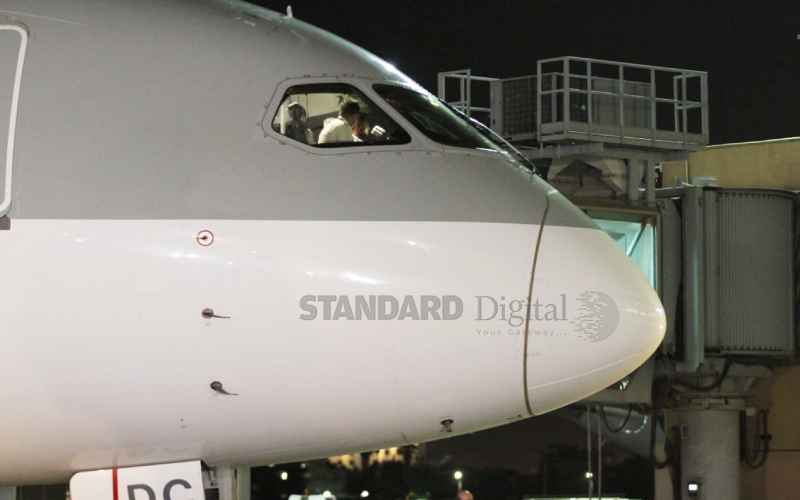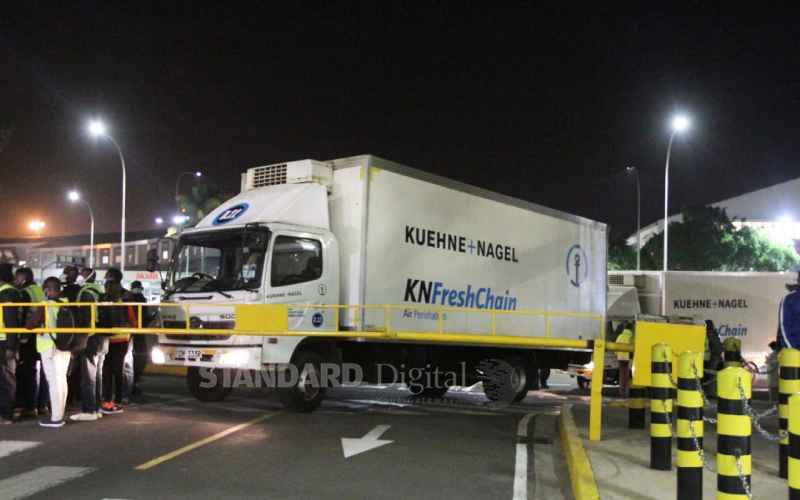Kenya has received the first consignment of the coronavirus vaccine.
Speaking from the Jomo Kenyatta International Airport on Tuesday midnight when the consignment of 1.02 million units of the Oxford-AstraZeneca vaccine arrived, Health CS Mutahi Kagwe said Kenya had been fighting the Covid war with rubber bullets, but with the vaccine, it now has the equivalent of machine guns.
However, he added that the war was not over and that Kenya was still in the middle of a pandemic.
The CS was flanked by Transport CS James Macharia and World Health Organisation representative Rudi Eggers. Kagwe thanked Unicef and the WHO for working with Kenya to make the Oxford-Astrazeneca vaccine available.
The Qatar Airways plane flight QR1341 ferrying the vaccines touched down at 11.50pm. The Oxford-Astrazeneca vaccine, which is best suited for Africa, will first be issued to frontline workers across the country.

The vaccines will be stored in Kitengela before being distributed across the country, CS Kagwe said. Priority will be given to regional hospitals before being rolled out to far-flung areas.
Among the first to receive the dose will be healthcare workers, followed by other frontline workers such as the police and teachers.
Next in line will be Kenyans with underlying health conditions that make them vulnerable to coronavirus.
The Health CS sought to allay fears that the vaccines may not be enough, clarifying that there will be subsequent batches.
He said the vaccination was voluntary and advised Kenyans to avail themselves of the opportunity to get protected from the disease.

A total of 459,000 doses of the 1.02 million Oxford-AstraZeneca vaccines will be distributed to level six and level four hospitals.
Level six will get 33,000 doses, while the military facilities (level four) will get 21,000 doses.
The 459,000 will mark the first dose of the vaccine which has been found to be effective when one is issued with two doses. The two doses are to be administered at least eight weeks apart.
The rest 525,000 will be issued later as the second dose.
Other groups prioritized in the first batch include vulnerable groups and hospitality workers.
According to the vaccination plan, the first phase will target 1.25 million people, while phase two will target 9.76 million individuals above the age of 50 years and those with comorbidity.
At least 4.9 million people are factored in the third phase.

The country is projected to receive 4.1 million doses of Oxford/Astrazeneca vaccine, manufactured by Serum Institute of India.
Other vaccines as part of Covid-19 Vaccines Global Access (Covax) include; Pfizer/BioNTech, Moderna, Johnson & Johnson, Sinopharm and Sinovac.
A dose of AstraZeneca is $7 (Sh700) while other vaccines range from $32 and $38.
All Covid-19 vaccines are given in two doses, apart from Johnson & Johnson, given a single dose.
The Covid-19 taskforce revealed that the government is considering allowing private facilities to sell the vaccines.
If allowed, the facilities will operate under the keen watch of the government.

Dr Willis Akhwale, the Chair of the Covid-19 task force said both private and hospitals will be used to carry out the vaccination.
Vaccination in public hospitals will be free, while the modality of standard pay in private facilities is still being worked on, to prevent the exploitation of Kenyans.
At least 479 Level IV, V and VI hospitals have been selected to be used for dispensation of the vaccine, among them, 195 are private.
Dr Akhwale, warned private facilities against attempting to conduct antibody testing, saying such might result in extra charges that are discouraged.
“Antibody testing is discouraged because it might charge patients more,” said Akhwale said in a recent presentation on Covid-19 vaccination rollout.
[Additional reporting by Jael Mboga, Graham Kajilwa, Elvis Ogina, Mercy Kahenda]
Credit: Source link